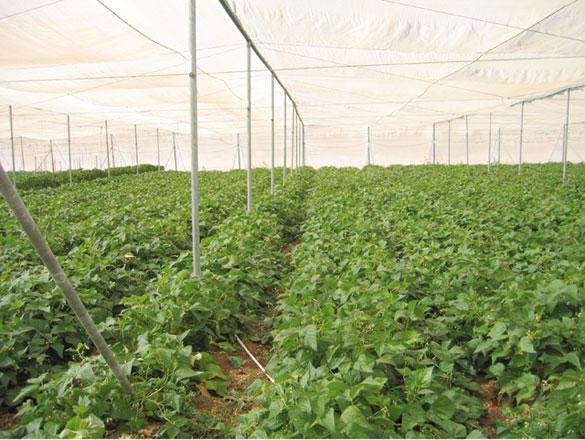You are here
Authorities examining crop damage after five-day frost spell
By Hana Namrouqa - Nov 27,2016 - Last updated at Nov 27,2016

To counter the effect of frost, farmers are urged to warm up greenhouses during the day and close them at night to preserve the heat (Petra file photo)
AMMAN — The Ministry of Agriculture on Sunday started examining the magnitude of crop damage in the Jordan Valley following a five-day frost spell, according to government officials.
“We have formed several technical teams and dispatched them as of today to evaluate the volume of damage to crops. The results will be out in three days,” the head of the Jordan Valley Agriculture Directorate, Abdul Karim Shehab, said.
He noted that initial examination indicates that vegetables such as zucchini, eggplant, bell pepper, beans and potato are hit by the freezing temperatures.
“Crop damages are more seen in low-lying areas that are close to the Jordan River, where temperatures dipped to below -1°C on Friday and Saturday mornings,” Shehab told The Jordan Times.
The Jordan Valley’s total agricultural area consists of 250,000 dunums, 170,000 of which are planted with vegetables and the rest with bananas, grains and citrus fruit.
Frost warnings are issued when clear skies are coupled with temperatures near or below zero and southeasterly winds, according to the Jordan Meteorological Department (JMD).
Meanwhile, the ministry’s spokesperson, Nimer Haddadin, underscored that during frost spells, farmers are advised to follow several instructions to minimise the impact of freezing temperatures on their crops.
Such measures include warming up greenhouses during the day and closing them at night to preserve the heat. In addition, when temperatures dip to around zero, farmers should also burn dry grass near the crops and irrigate them slightly to minimise the impact of frost.
Also, cattle breeders should visit the ministry’s directorates and veterinary clinics to receive vaccines and instructions on how to keep newborn animals inside barns, and secure water and fodder for them.
“The ministry has issued earlier this year instructions to farmers to avoid growing crops that are vulnerable to frost and the changing climate,” Haddadin said.
He noted that farmers should wait until marbaniyeh ends to plant crops sensitive to the cold, stressing that field vegetables such as potatoes, zucchini, beans and aubergines are “very sensitive” to the cold weather of marbaniyeh, and they are damaged when frost spells hit.
Marbaniyeh is the local name for the 40 coldest days of winter, when cold and dry easterly winds cause frost spells.
Temperatures in the Jordan Valley on Monday are expected to range between a high of 26°C and a low of 8°C, according to the JMD.
In Amman, mercury levels will be between a high of 16°C and a low of 4°C, while the weather in Aqaba will be relatively cold, with temperatures between 24°C and 13°C.
Related Articles
AMMAN — The Ministry of Agriculture on Tuesday urged farmers to cultivate vegetables that can withstand freezing temperatures, to avoid loss
AMMAN — The government should provide farmers with early-warning frost detection systems instead of advising against planting crops that are
AMMAN — The "early" formation of frost in the northern and central parts of the Jordan Valley indicates a climate change that could herald m














